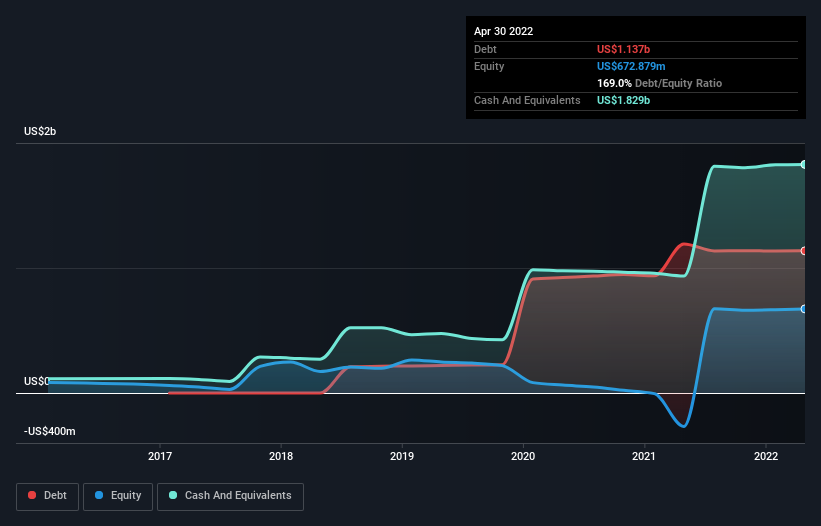
Legendary fund manager Li Lu (who Charlie Munger backed) once said, 'The biggest investment risk is not the volatility of prices, but whether you will suffer a permanent loss of capital.' It's only natural to consider a company's balance sheet when you examine how risky it is, since debt is often involved when a business collapses. We note that MongoDB, Inc. (NASDAQ:MDB) does have debt on its balance sheet. But should shareholders be worried about its use of debt?
When Is Debt A Problem?
Generally speaking, debt only becomes a real problem when a company can't easily pay it off, either by raising capital or with its own cash flow. If things get really bad, the lenders can take control of the business. However, a more usual (but still expensive) situation is where a company must dilute shareholders at a cheap share price simply to get debt under control. Of course, the upside of debt is that it often represents cheap capital, especially when it replaces dilution in a company with the ability to reinvest at high rates of return. When we think about a company's use of debt, we first look at cash and debt together.
Check out our latest analysis for MongoDB
What Is MongoDB's Debt?
You can click the graphic below for the historical numbers, but it shows that MongoDB had US$1.14b of debt in April 2022, down from US$1.19b, one year before. But it also has US$1.83b in cash to offset that, meaning it has US$691.3m net cash.

How Strong Is MongoDB's Balance Sheet?
According to the last reported balance sheet, MongoDB had liabilities of US$503.7m due within 12 months, and liabilities of US$1.26b due beyond 12 months. On the other hand, it had cash of US$1.83b and US$164.9m worth of receivables due within a year. So it actually has US$231.9m more liquid assets than total liabilities.
Having regard to MongoDB's size, it seems that its liquid assets are well balanced with its total liabilities. So while it's hard to imagine that the US$16.4b company is struggling for cash, we still think it's worth monitoring its balance sheet. Succinctly put, MongoDB boasts net cash, so it's fair to say it does not have a heavy debt load! When analysing debt levels, the balance sheet is the obvious place to start. But ultimately the future profitability of the business will decide if MongoDB can strengthen its balance sheet over time. So if you want to see what the professionals think, you might find this free report on analyst profit forecasts to be interesting.
Over 12 months, MongoDB reported revenue of US$978m, which is a gain of 52%, although it did not report any earnings before interest and tax. Shareholders probably have their fingers crossed that it can grow its way to profits.
So How Risky Is MongoDB?
We have no doubt that loss making companies are, in general, riskier than profitable ones. And in the last year MongoDB had an earnings before interest and tax (EBIT) loss, truth be told. Indeed, in that time it burnt through US$1.6m of cash and made a loss of US$320m. But the saving grace is the US$691.3m on the balance sheet. That means it could keep spending at its current rate for more than two years. With very solid revenue growth in the last year, MongoDB may be on a path to profitability. Pre-profit companies are often risky, but they can also offer great rewards. There's no doubt that we learn most about debt from the balance sheet. But ultimately, every company can contain risks that exist outside of the balance sheet. To that end, you should be aware of the 4 warning signs we've spotted with MongoDB .
When all is said and done, sometimes its easier to focus on companies that don't even need debt. Readers can access a list of growth stocks with zero net debt 100% free, right now.
If you're looking to trade MongoDB, open an account with the lowest-cost platform trusted by professionals, Interactive Brokers.
With clients in over 200 countries and territories, and access to 160 markets, IBKR lets you trade stocks, options, futures, forex, bonds and funds from a single integrated account.
Enjoy no hidden fees, no account minimums, and FX conversion rates as low as 0.03%, far better than what most brokers offer.
Sponsored ContentNew: Manage All Your Stock Portfolios in One Place
We've created the ultimate portfolio companion for stock investors, and it's free.
• Connect an unlimited number of Portfolios and see your total in one currency
• Be alerted to new Warning Signs or Risks via email or mobile
• Track the Fair Value of your stocks
Have feedback on this article? Concerned about the content? Get in touch with us directly. Alternatively, email editorial-team (at) simplywallst.com.
This article by Simply Wall St is general in nature. We provide commentary based on historical data and analyst forecasts only using an unbiased methodology and our articles are not intended to be financial advice. It does not constitute a recommendation to buy or sell any stock, and does not take account of your objectives, or your financial situation. We aim to bring you long-term focused analysis driven by fundamental data. Note that our analysis may not factor in the latest price-sensitive company announcements or qualitative material. Simply Wall St has no position in any stocks mentioned.
About NasdaqGM:MDB
Flawless balance sheet and fair value.
Similar Companies
Market Insights
Community Narratives



